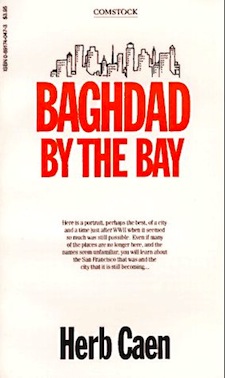LETTERS FROM THE GLOBAL PROVINCE
Are They Off Their Rockers? Global Province Letter, 14 August 2013
Do not shake me. I am full of tears.
— Raymond Theodore Barthelmess (aka Henri Calet)
Tears and Laughter. We read in Robert V. Camuto’s Corkscrewed: Adventures in the New French Wine Countrythat Francois des Ligneris had lost the family vineyard Chateau Soutard for the dumbest of reasons: his sisters were determined to sell out. In this he shares the fate of several newspapers in the United States where just a few family members have forced cherished journals to be put on the block. Such was the reason for the demise of the Wall Street Journal which was sold off because of cash hungry relatives in the Bancroft clan, only to wind up in Rupert Murdoch’s stable where the paper has succumbed to progressive evisceration..
When asked how he felt, Ligneris invoked Calet. He was full of tears.
But such an absurd ending to a family’s crown jewel could make any of us smile through our tears. The idiocy makes us chuckle; the sadness makes us cry. We notice that several of the great philosophers and even a writer or two such as Camus talk in circles when defining the absurd. For us it is easy. The absurd makes us laugh and makes us cry.
The Absurd Is Surely Loose in San Francisco. Just a half a century ago San Francisco carried significance and influence throughout the world that ranged way beyond its actual weight. We were reminded of this recently at the Mandarin San Francisco, which may be, very quietly, the most stupendous hotel in the country. Now some 26 years old, it was the Mandarin Group’s first entry in the United States, and even today it is the chain’s most comfortable and most remarkable hostelry. It is built into a skyscraper, and so when we visited this last month, we were able, from our crosswalk and room on a mid-fortieth floor, to cast our eyes over a huge compass, maybe 270 degrees for all we know. For a moment, from on high, we were commanders of the universe. From this hotel San Francisco is a very pretty oyster. The Mandarin is one of the remaining greats in the city by the bay, unknown to most.
But the city is now perpetually in decline. Its commercial base has deteriorated badly, maybe best symbolized by the move of Bank of America’s headquarters to backwater Charlotte, North Carolina. A disproportionate number of vagrants camp in even the nicest areas of the city. To walk into many colorful establishments is—often—to brush up against a layer of grime brought on by weak management and a lackadasical, somewhat entitled, labor force.
 Slaughtering 18.000 Trees. San Francisco appears to be a goofy city bent on committing suicide. Footloose environmentalists and city planners have a scheme afoot to uproot a huge number of “non-native” trees so as to put down more local plants.
Slaughtering 18.000 Trees. San Francisco appears to be a goofy city bent on committing suicide. Footloose environmentalists and city planners have a scheme afoot to uproot a huge number of “non-native” trees so as to put down more local plants.
“After a city environmental review is completed as expected next year, officials of the San Francisco Recreation and Park Department say they hope to remove about 18,000 trees from public parks in San Francisco and neighboring San Mateo County over the next 20 years. They will plant oak trees, elderberry bushes and other plants in their place, while also restoring grasslands and other native habitats that dominated the landscape before Europeans arrived.”
Needless to say, this is not a middle of the road approach where you take out some trees to allow other plant species to flourish. This is draconian, some would say Stalinist, nativism, which could make citizens of any political stripe worry about the reach of government. It is the sort of unthinking ideological mindset that seems to have sapped the vitality out of San Francisco.
 The city still has much of the old charm and whimsicality. But it has lost its greatness. It is fun for the visitor to run into a San Francisco detective who brings his cute dog Alex to any restaurant, having secured a permit for the dog to render him assistance anywhere in the city. And it is a delight to go to another hot restaurant that serves Mexican coca colas (which are made with real sugar and not fructose), dressed up like margaritas, as cocktails for those who do not want to get sloshed during a night out on the town. Yet tears fall from our eyes when we hearken back to the days when leaders of San Francisco from a mix of progessions, many of them members of the Bohemian Club, joined hands to architect a city of greatness.
The city still has much of the old charm and whimsicality. But it has lost its greatness. It is fun for the visitor to run into a San Francisco detective who brings his cute dog Alex to any restaurant, having secured a permit for the dog to render him assistance anywhere in the city. And it is a delight to go to another hot restaurant that serves Mexican coca colas (which are made with real sugar and not fructose), dressed up like margaritas, as cocktails for those who do not want to get sloshed during a night out on the town. Yet tears fall from our eyes when we hearken back to the days when leaders of San Francisco from a mix of progessions, many of them members of the Bohemian Club, joined hands to architect a city of greatness.
This town, like many, needs more trees, not less, whether they be local or imports from China. It hardly needs so-called “local schemes.” Localism is a tendency that is rife in farmers’ markets and in minds that want to shut out the world. Very little good will arise from erecting fences around our intellects. Rest assured that there is nothing innately superior about local plants, local biases, and local ideas. Each region tends to have one or two things in abundance that are worthy of attention: many other cherished localisms are really just weeds.
The Stripped Down University. San Francisco, as well, is the locus of one Ben Nelson who is putting together a very stripped down virtual university that will lack a lot of physical plant; sports; basic building block courses, and a whole assemblage of things that lie at the heart of America’s great universities.
“But Minerva will have no hallowed halls, manicured lawns or campus. No fraternities or sports teams. Students will spend their first year in San Francisco, living together in a residence hall. If they need to borrow books, says Mr. Nelson, the city has a great public library. Who needs a student center with all of the coffee shops around?
Each of the next six semesters students will move, in cohorts of about 150, from one city to another. Residences and high-tech classrooms will be set up in the likes of São Paulo, London or Singapore, details to come. Professors get flexible, short-term contracts, but no tenure. Minerva is for-profit.”
The Wall Street Journal entitles its celebration of the Nelson idea—“Ben Nelson: The Man Who Would Overthrow Harvard.” Putting aside the enthusiasm of the writer who is on the WSJ editorial board, we must ask where’s the beef? San Francisco itself has now become a decorative experience where everything looks nice, but the core is lacking. Mr. Nelson’s dream seems to be a packaging exercise, but lord help us when we open the package. Colleges are bricks and mortar, and virtual world pipe dreams cannot replicate that experience.
Nelson’s folly is enough to make you weep. When you are not chortling.
P.S. We are reminded that great men save trees and plant more, the mediocre tear them down. Bernard Maybeck, San Francisco’s great domestic architect, saved a lone tree in Berkeley, which, last time we looked, was still standing.
“On motion of Commissioner Maybeck … it was VOTED—to recommend that the tree on Le Roy Avenue not be removed, on the ground that it was a beautiful and thrifty tree, and a great asset to the neighborhood.” Minutes, Berkeley Civic Art Commission, November 7, 1921, available at the Zoning Board, Berkeley City Hall.
32. Sergeant, Geniuses, Goddesses, and People, p. 282.
Maybeck also thought he had done a successful house if his client completed its outside in a manner harmonious with the spirit of the residence.
P.P.S. To reach beyond the absurdity of people who would tear down trees, we would read about David Milarch who goes about the country trying to find healthy giants of many kinds of trees in order to preserve the best and brightest for future generations. In “Measuring the Sycamore,” one learns how championship trees are celebrated in New York State.
"Perhaps we record these natural phenomena, above all, because we fear their impending absence; implicit in nearly any act of measurement is the anticipation of losing the item measured. And when it comes to things like the sycamore tree, we know in our hearts that when they are gone, their loss will be immeasurable. "
P.P.P.S. Camuto’s books on the unique wine producers of France and Sicily are tremendously pleasant escapes from the dog days of August. Nicely, they are for wine generalists, not geeky specialists.
P.P.P.P.S. See definition of localism under Wit and Wisdom
P.P.P.P.P.S. The most interesting change in the whole Bay area is that Asians are becoming dominant. This is leading to interesting cultural developments, and provides an interesting bridge to Asia that could re-ignite San Francisco. We think that when the counting is done properly (the census data is strangely aggregated) Asians today may now be in the majority in San Francisco. Read Andrew Lam to learn how the Asian surge is already changing the complexion of Northern California.
Home - About This Site - Contact Us
Copyright 2013 GlobalProvince.com